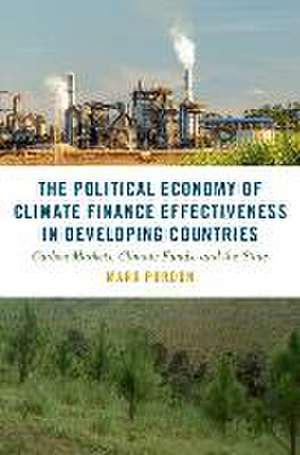The Political Economy of Climate Finance Effectiveness in Developing Countries: Carbon Markets, Climate Funds, and the State: Studies in Comparative Energy and Environmental Politics
Autor Mark Purdonen Limba Engleză Hardback – 25 sep 2024
Preț: 344.00 lei
Preț vechi: 470.24 lei
-27% Nou
Puncte Express: 516
Preț estimativ în valută:
65.88€ • 67.23$ • 55.43£
65.88€ • 67.23$ • 55.43£
Carte disponibilă
Livrare economică 24-30 ianuarie
Livrare express 21-25 ianuarie pentru 92.38 lei
Preluare comenzi: 021 569.72.76
Specificații
ISBN-13: 9780197756836
ISBN-10: 0197756832
Pagini: 376
Ilustrații: 17 b/w figures; 30 tables
Dimensiuni: 152 x 229 x 31 mm
Greutate: 0.68 kg
Editura: Oxford University Press
Colecția OUP USA
Seria Studies in Comparative Energy and Environmental Politics
Locul publicării:New York, United States
ISBN-10: 0197756832
Pagini: 376
Ilustrații: 17 b/w figures; 30 tables
Dimensiuni: 152 x 229 x 31 mm
Greutate: 0.68 kg
Editura: Oxford University Press
Colecția OUP USA
Seria Studies in Comparative Energy and Environmental Politics
Locul publicării:New York, United States
Recenzii
With careful attention to domestic politics, Professor Purdon provides a detailed, nuanced, and timely contribution to the increasingly contested question of how climate finance instruments are best implemented in lower-income countries.
If you are searching for empirical evidence on the effectiveness of climate finance instruments in developing countries, this is the book you need. It helps one to understand political economy factors that are critical for their effective implementation. Above all, the book brings a fresh perspective on the role of the state in shaping the effectiveness of climate finance instruments.
What are the 'real' impacts over time of climate finance mechanisms? Professor Purdon presents an original field-based analysis of the effectiveness of the CDM, REDD+, and NAMAs from their beginning in three low-and middle-income countries over 10 years. The book provides a state of play of conditions that favor climate mitigation outcomes for the greater good of humanity. It is an important piece of work at a time when global climate governance is more than ever needed." -Jean Lebel, Fellow and Adjunct Professor, Institut d'Études Internationales de Montréal (IEIM), Université du Québec à Montréal (UQÀM), and former President, International Development Research Centre (IDRC)
This book is an empirically rich exploration of the politics of transition to low-carbon development in low-income countries. By taking a historically grounded, comparative analysis of climate finance implementation in Tanzania, Uganda, and Moldova, Purdon offers an illuminating contribution to the growing literature on developmental environmentalism. The book presents key findings from a decade-long investigation and reveals how the developmental state remains central amidst a plethora of global environmental norms. A must read for anyone interested in recentring the state in the politics of climate finance within the global south.
If you are searching for empirical evidence on the effectiveness of climate finance instruments in developing countries, this is the book you need. It helps one to understand political economy factors that are critical for their effective implementation. Above all, the book brings a fresh perspective on the role of the state in shaping the effectiveness of climate finance instruments.
What are the 'real' impacts over time of climate finance mechanisms? Professor Purdon presents an original field-based analysis of the effectiveness of the CDM, REDD+, and NAMAs from their beginning in three low-and middle-income countries over 10 years. The book provides a state of play of conditions that favor climate mitigation outcomes for the greater good of humanity. It is an important piece of work at a time when global climate governance is more than ever needed." -Jean Lebel, Fellow and Adjunct Professor, Institut d'Études Internationales de Montréal (IEIM), Université du Québec à Montréal (UQÀM), and former President, International Development Research Centre (IDRC)
This book is an empirically rich exploration of the politics of transition to low-carbon development in low-income countries. By taking a historically grounded, comparative analysis of climate finance implementation in Tanzania, Uganda, and Moldova, Purdon offers an illuminating contribution to the growing literature on developmental environmentalism. The book presents key findings from a decade-long investigation and reveals how the developmental state remains central amidst a plethora of global environmental norms. A must read for anyone interested in recentring the state in the politics of climate finance within the global south.
Notă biografică
Mark Purdon is Associate Professor in the Department of Strategy, Social and Environmental Responsibility at the Université du Québec à Montréal (UQAM) where he holds the Chair in Decarbonization. He is an expert in the emerging field of comparative environmental policy, which combines elements of comparative politics, comparative public policy and international relations. He is particularly interested in the relationship between climate change policy and political economy and has extensive research experience in both developing and developed countries. Purdon earned a PhD in political science at the University of Toronto in 2013 and completed a Postdoctoral Fellowship at the London School of Economics in 2014.


